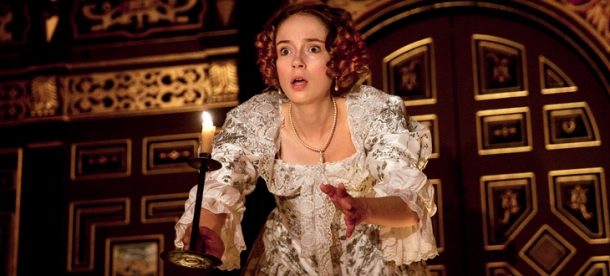Part of the Idylls of the King, which in the various books I have is never presented as a single coherent work, but as a set of various individual poems that belong to a cycle, and I guess Lord Alfred continued to add more episodes even after it was nominally finished. When I come around to undertaking the whole thing I suppose I will have to figure out what is considered really in and what isn't.
I've always been all right with reading Tennyson. He is still a pillar of English Poetry, and familiarity with some of his mass, his stories, his language, his way of looking at things, has been helpful to me as a background for reading other things. Right now my concentration and frame of mind are not conducive to do any very good reading of anything, but I am retaining contact with the field, and dipping into these classic guys on a semi-regular basis is important to me. (smooth and stout and suffering from comparatively little decay compared to some of his forbears,...I had meant to delete this but apparently forgot to. Maybe I will keep it in. It's not a chiseled thought, but maybe it indicates something).
King Arthur is too beta in this section, both in the way he is perceived by his disgraced queen as she reminisces on the delights of her relationship with Lancelot, and in his own address to her:
"I cannot touch thy lips, they are not mine,
But Lancelot's: nay, they never were the King's.
I cannot take thy hand; that too is flesh,
And in the flesh thou hast sinned; and mine own flesh,
Here looking down on thine polluted, cries
'I loathe thee:' yet not less, O Guinevere,
For I was ever virgin save for thee,
My love through flesh hath wrought into my life
So far, that my doom is, I love thee still."
No wonder Camelot fell.
Edward Hoaglund--"The Problem of the Golden Rule"
I had never heard of this guy, though he is still alive (born 1932), has been called the best essayist of his generation by numerous people (well, Edward Abbey and John Updike anyway) and has been working pretty steadily publishing in old guard magazines and newspapers right up to the present (articles of his appeared in the New York Times and The American Scholar in 2013!). His peak visibility and influence seems to have been in the late 60s and 70s. He is one of these old New York City/Deerfield Academy/Harvard guys who has lived in Vermont for decades now, when he isn't at his other place on Martha's Vineyard. The essay assigned for me appeared in Commentary in August of 1969. It was included in a collection of his essays published in 1979 under the title of The Edward Hoaglund Reader. I am always curious to read what people with some real literary perspective and ability have to say about this particular period, and this Hoaglund does have some of this. He has a talent for the hook--whenever he introduces an episode or an observation it seems like it is going to be interesting. In this essay however, these promising introductions never really come through, and they certainly do not come together to form any kind of unified theme in my mind. The premise of the essay is that in the modern world there are too many people, with most of whom one has increasingly little in common, to regard everyone as an individual or some kind of spiritual brother whom one can be expected to treat as one would be treated himself. He does not exactly wander away from this premise, but he does not maintain his focus on it with the clarity that I at least require. There is a germ there of a good idea, but the examples he uses to illustrate it are kind of all over the place, do not connect with each other all that well, and do not lead to any very vivid conclusion. I am piqued enough to try a couple more of these essays however and see if they have anything to say to me. I could use more somewhat contemporary writers whose manner I can bear.
Here is a sample passage. Does it give one something to chew over?:
"The difficulty will be how we regard individual people, a question which involves not only whether we think we're immortal but whether we think they are. The crowded impatience of suburb-city living doesn't often evoke intimations of other people's immortality, and neither do the hodge-podge, leveling procedures of a modern democracy. So much of the vigor of the Victorian church, for instance, grew out of the contrast between its members and the raw, destitute brown masses who covered the rest of the globe. Among an elite, self-congratulatory minority even the greatest of attributes--immortality--seemed plausible."
Milton--"Comus" (or, "A Mask")
This is pretty early Milton--he was 25 when it was presented. He had of course already been writing poetry for years by that point, and had already written 'L'Allegro' and "Il Penseroso', which retain some fame, though I have not as yet read these and passed my own all important judgment upon them. Milton is assuredly among those poets I still believe it does me good to retain contact with, even though at this point I would be hard-pressed to prove that classical English poetry has anything to do with my life, or that it will have anything meaningful to do with most of my children's lives (because all my own efforts at learning and development henceforth should be undertaken with a primary eye towards benefiting them). I have long believed that Milton is by far the least appreciated of the truly great English language authors. Even supposedly highly educated people think it is acceptable to scoff at reading him and assert that he is boring. In this one instance maybe more than any other I feel compelled to think, if the person is otherwise very confident and assertive regarding his own intelligence, 'no, it is you who are boring, and you reveal a limit in your own mental capacity that I have taken note of and marked as important whether you consider it so or not'. Maybe it is not quite this dramatic, but some thought of the kind does flutter across my mind even when everyone present, myself included, is more than satisfied of the otherwise overwhelming mental supremacy of my adversary. We English speakers take our language, a mighty gift and legacy that our forbears have bequeathed to us, too much for granted. Our precious intelligence is formed in large part by the images and scope for organized thought that our words give us, the possibilities of which are demonstrated by the great writers and speakers of our language, of whom Milton obviously was one.
All right, now that I have put in my plug for Milton, what do I think of the 'Comus'? It has the air of an exercise that our poet wanted to undertake. The subject involves a virgin who is separated from her brothers and protectors while crossing a wood and is set upon by a Satan-like figure (Comus) who is eager to relieve of her virtue, and the power of that virtue, if it is genuine, even in the face of the most dire threats. While Milton is careful in the course of most of his poems regarding matters of chastity and personal morality to present his official position as conformable with Puritan norms, he has a pronounced tendency to expound at great length, with great imaginativeness and great gusto on the alternative arguments to these correct positions. That is the best part of this poem too, when Comus dismisses the idea that God wants us to live a humble and austere life by pointing out the almost comical abundance with which He has furnished the world for our pleasure:
"Wherefore did nature powr her bounties forth
With such a full and unwithdrawing hand,
Covering the earth with odours, fruits, and flocks,
Thronging the seas with spawn innumerable,
But all to please and sate the curious taste?
And set to work millions of spinning worms
That in their green shops weave the smooth-hair'd silk
To deck her sons, and that no corner might
Be vacant of her plenty, in her own loyns
She hutch't th'all-worshipt ore and precious gems
To store her children with; etc....
To which the virtuous lady replies with:
Imposter, do not charge most innocent nature,
As if she would her children should be riotous
With her abundance...
Is it possible that there is not intellectual value in being exposed to this kind of concise, detailed, comprehensive and unique way of regarding the world and our existence on it? These are the kinds of arguments that would-be defenders of the humanities should be making and persuading people of the importance of if they want those studies to remain generally alive, that these kinds of studies do expand the mind, do expand thereon the collective richness and quality afoot in the common society. I don't know that even this will work on the general public, but someone at least ought to be able to put forth the argument confidently.






No comments:
Post a Comment